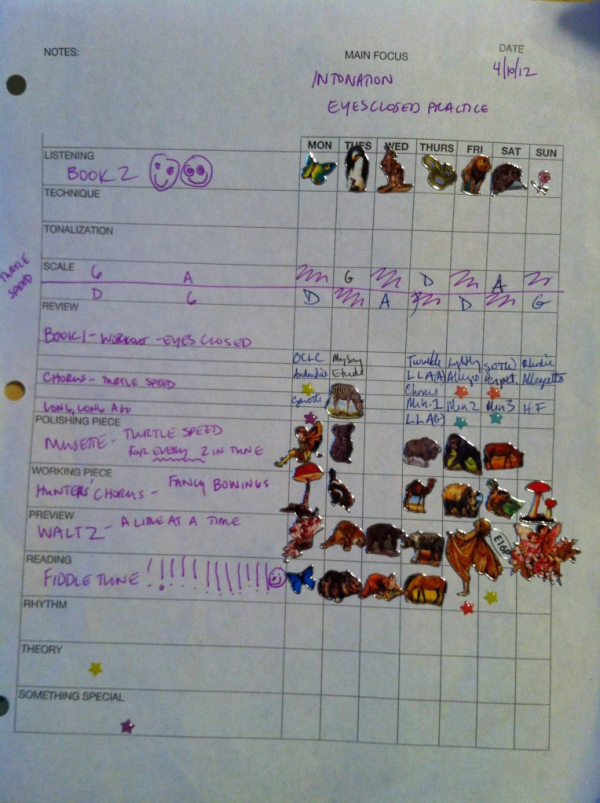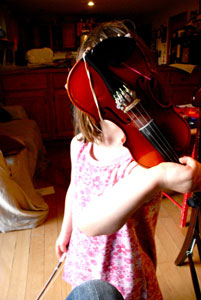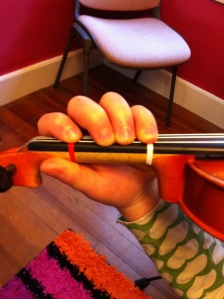 I'm in awe of Nerissa Nields's latest post for our music blog. It's perhaps a cliche these days among teachers and parents to say – however true it may be – something like "My students (or daughter) actually teaches me." Nerissa certainly borrows that approach, but her entry doesn't stop there. She goes on to talk about music, yoga, and her daughter's violin lessons as practices where chasing perfection only distracts the practitioner. In the end, Nerissa's approach is both terrifying and peaceful: it suggests that if there is a goal to our dearest pursuits, it's not conventional success but the humility that comes from struggle.
I'm in awe of Nerissa Nields's latest post for our music blog. It's perhaps a cliche these days among teachers and parents to say – however true it may be – something like "My students (or daughter) actually teaches me." Nerissa certainly borrows that approach, but her entry doesn't stop there. She goes on to talk about music, yoga, and her daughter's violin lessons as practices where chasing perfection only distracts the practitioner. In the end, Nerissa's approach is both terrifying and peaceful: it suggests that if there is a goal to our dearest pursuits, it's not conventional success but the humility that comes from struggle.
Each week, our violin teacher gives us a practice plan, a sheet with a grid on it with the daysof the week horizontally across the top and various items listed vertically on the left hand side of the page.
At the top of every sheet, as you can see, is something Suzuki teachers call Main Focus. One week the focus might be on the bow hold; another week it could be getting the hand and wrist aligned. Recently we were focusing on intonation (getting the notes in tune, which is no small feat when there are no frets, sez this guitar player–and made me realize how like singing violin playing is since one needs to rely on one’s ear for pitch.) This week the Practice Point is about getting the fingers to stand up, so that the tips touch the string and are not flat like pancakes. We practice to make it easy, says our teacher Emily Greene. And we make it easy by doing alittle every day, not forcing perfection (which is the enemy of the people, as the great Anne Lamott is fond of saying) but nodding at improvement. OK, wildly applauding improvement. With a six-year-old, it’s pretty stunning how quickly the brain absorbs the teaching, and how, when guided gently, the playing grows and improves. On the other hand, a phrase learned with a wrong bowing and not corrected is fairly difficult to unlearn. We tend to have the same “sticky” passages everyone else has, but if we learn them right the first time and go slowly to learn them, we pass by these obstacles with ease. If I let her play them over and over, knowing vaguely there’s something wrong but not having the energy to get off my seat and check the video (yes, I video the teacher playing the piece correctly during the lesson), then Lila will have to do many repetitions later on to get it right.
We practice to make it easy, says our teacher Emily Greene. And we make it easy by doing alittle every day, not forcing perfection (which is the enemy of the people, as the great Anne Lamott is fond of saying) but nodding at improvement. OK, wildly applauding improvement. With a six-year-old, it’s pretty stunning how quickly the brain absorbs the teaching, and how, when guided gently, the playing grows and improves. On the other hand, a phrase learned with a wrong bowing and not corrected is fairly difficult to unlearn. We tend to have the same “sticky” passages everyone else has, but if we learn them right the first time and go slowly to learn them, we pass by these obstacles with ease. If I let her play them over and over, knowing vaguely there’s something wrong but not having the energy to get off my seat and check the video (yes, I video the teacher playing the piece correctly during the lesson), then Lila will have to do many repetitions later on to get it right.
Today in my yoga class, my teacher came by while I was in a pose called Shalambasana (on the floor, prone, with my hands clasped behind my back, lifting up my head, chest and feet.) “Nerissa, your feet are a little too wide apart. There you go, that’s better.” And as I let her adjust me, and as I felt the internal adjustment my body was making, I felt the sweet bliss of alignment. I also felt a little dismayed. I have been practicing yoga for longer than I have played an instrument. I am halfway through a teacher training, and I do a sun salutation every day that incorporates this very pose. Every single morning, I thought, I have been doing this pose wrong! What’s the use? I should sleep in; I’d cause way less damage.
 I can see I am on the way to a lengthy sermon here on the merits of making mistakes and living with mistakes and how, in fact, mistakes are our greatest teachers. I heard a story recently about pilgrims who ascended a mountaintop to speak with a Great Wise Enlightened One. “Tell me, GWEO, what is the secret to becoming Wise?” The GWEO thought for a few moments. “Good choices,” he wheezed. “But how do you make good choices,” the pilgrims persisted. “Experience,” he nodded sagely. “And how, GWEO, do we get experience?” “Ah,” said the Wise One. “Bad Choices.”
I can see I am on the way to a lengthy sermon here on the merits of making mistakes and living with mistakes and how, in fact, mistakes are our greatest teachers. I heard a story recently about pilgrims who ascended a mountaintop to speak with a Great Wise Enlightened One. “Tell me, GWEO, what is the secret to becoming Wise?” The GWEO thought for a few moments. “Good choices,” he wheezed. “But how do you make good choices,” the pilgrims persisted. “Experience,” he nodded sagely. “And how, GWEO, do we get experience?” “Ah,” said the Wise One. “Bad Choices.”
Are we really taking Suzuki to win some kind of violin competition? Were we ever? For me, anyway – I can’t speak for Lila – I’m in it for the same reason I practice yoga. To be present. To make art with love, and to make love with art. To pay attention. For progress, not perfection, and ultimately to attain that sweetest and most elusive of all qualities: humility. And while I was there on the floor (humility comes from the root humus, soil, ground, after all) my despair turned to gratitude. Here was my chance to change my choices, which as an artist, musician and a lover is all that I have.


